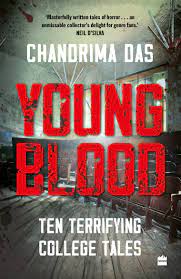Campus Ghosts
Book
Review
Title: Young Blood
Author: Chandrima Das
Publisher: HarperCollins India, 2021
People
enjoy reading horror fiction or watching horror movies because the emotional
roller coaster rides provided by them are delightfully scary while being mere
illusions. Chandrima Das’s short stories in the collection titled Young Blood are
brilliant creations based on certain legends and beliefs particularly on ten Indian
university campuses. Every story in this book succeeds remarkably well in
creating tension, fear, stress and shock in the reader. Moreover, they have
some very memorable characters.
The stories
are all set in a university campus – ranging from the defunct Khairatabad
Science College in Hyderabad to the sanctimonious St Anthony’s College premises
in Shillong. Each story is unique too. If a whole college building becomes a
monstrous and gigantic ghost in the first story, a witch (chudail) haunts us in
the second, and one’s own inner demons apparently metamorphose into ghosts in
another, and so on.
One of the
delightful charms of this book is the way the characters are shaped by the
author as well as their own pasts. Das gives a very realistic and convincing
background to each of the major characters who are haunted by the ghosts in the
tales. Aditi of St Bede’s College, Shimla (second story), seems to invoke upon
herself the ghost that haunts her with all the pent-up negativity of hers. Are
the ghosts who attack Nirav and Pavitra in the Indian Institute of Technology,
Kharagpur (fifth story), conjured up by their own mutual misgivings?
One of the
bonuses of these horror tales is that they force us to look into our own hearts
too sometimes. Are we nurturing a devil somewhere down there, in one of the
dark chambers of our heart?
Not all of
the ghosts we encounter here are malicious. The ghost on the campus of
Fergusson College, Pune (6th story), is very benign at least to the
protagonist. Manisha is in a terrible condition having lost her father and with
her mother lying in coma in the ICU of a hospital. She is running out of money.
Vishesh, her boyfriend, helps her but he is a psychotic of sorts. It is her
helplessness that keeps Manisha glued to Vishesh and it takes the ghost of
Jhanvi to make her realise that “love is not control.” After all, Jhanvi was
killed by her own boyfriend on the campus.
Chandrima Das
is dexterous with the creation of not only characters that haunt us as eerily
as the ghosts that haunt them but also the setting and environment. The putrid
odour of Khairatabad lingers with us much after we leave it at the end of the
story. The “dozens and dozens of bloated maggots wriggling in unison” in the
mouth of Ashutosh Mukherjee of ‘Ghost of a Chance’ (8th story) will
haunt the feeble-hearted for long.
However, it
is not just terror that Chandrima Das presents us. She works with a whole range
of human emotions from love and hatred to jealousy and rivalry. Along with the
moments of pure and utter fear lie moments of stillness. That is where Das
emerges as an effective story-teller.
The book is a
delectable pick for those who love horror fiction.
PS. This
review is powered by Blogchatter
Book Review Program
Order your copy at Amazon India

I generally dont want horror movies because I am easily scared. But I do pick a horror book once in a while, because I can just put it down when scared. Guess this would be my scary book of 2022
ReplyDeleteI am not fond of horror fiction too though as a young man I used to enjoy it particularly the Dracula variety.
Delete